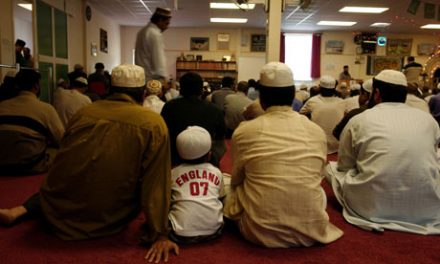
The Role of Universal Principles
There is mutual reinforcement and great many interesting similarities between views expressed by Islamophobes and Islamic extremists. The following passages propose that it is necessary for sound scholarship to defy, both, Islamophobes and Islamic extremists via a balanced position that is based on widely-accepted universal
principles, such as justice, equality, freedom, peaceful co-existence, and basic human rights. In addition to being widely-accepted ‘secular’ values, these principles are very similar to Islam’s fundamental purposes, higher objectives, intents, or ends (Arabic: maqasid), which are rapidly gaining popularity and legitimacy in current Islamic literature. The proposed position will hopefully achieve a much-needed broad public rejection of Islamophobia and Islamic extremism, alike. ‘Scholarship’ includes Islamic scholarship, western scholarship and, especially, scholarship that identifies itself as being both ‘western’ and ‘Islamic.’ Below are a few illustrative examples from topics that are often addressed amongst Islamophobes and Islamic extremists, namely, the status of women in Islam, violence, civility, social integration, and morality.
The Islamophobic version of the status of women in Islam is that Islam itself is inherently oppressive to women, Muslim men have a right to force women to a certain dress code and to abuse them, and Muslim women simply do not have political, economic, or social rights. The alternative Islamic extremist version could be frankly and rightly described as androcentric. In this version, the Islamic scripts are (mis)interpreted in a men-serving style that is contrary to the very Quranic principles of equality, kindness, and justice. The scholars’ role is to defy both similar narrations based on a referral to fundamental (Islamic) higher purposes. Emphasis should be placed on freedom as, indeed, an Islamic end, which entails that no one has a right to force anyone, man or woman, to practice Islam in a certain manner; ‘there is no compulsion in matters of faith.’ Emphasis should be also placed on equality of all humans, men and women, as one of Islam’s higher, and overriding, principles.
Islamophobes also see Islam as a ‘violent religion,’ ‘in which God orders you to send your son to die for Him,’ and that Muslims, by definition, have violent tendencies that should be dealt with via pre-emptive strategies. And so on. The alternative Islamic extremist view does not seem to value human life in the way Islamic scripts and traditions value human life. Again, critical scholarship has an obligation in defying both false narrations via the universal values of justice and peace. Acts of violence combined with injustice, whether on an individual or a mass scale, should be included in the definition of unacceptable acts of terror, whatever the labels and justifications they take. Again, higher principles and moral ends of justice and peace offer much-needed universal grounds in this area.
Similarly, Islamophobes see Islam as an intolerant religion that is ‘incompatible with civility.’ Thus, they exclude Muslim individuals, networks, and organizations from their version of ‘secular’ civil society. Through their actions, Islamic extremists present Islam as an intolerant religion that is certainly non-secular, as well. Scholars should carry out the delicate task of explaining how Islamic, and all religious-based, activism is indeed a form of civil behaviour – despite the actions of some fringe groups – as long as it embodies values such as tolerance, reciprocity, cooperation, and so on. A specific religious-based manifestation of ‘civility,’ does not have to take the same form of a Eurocentric ‘secular tradition,’ for lack of a better term.
Islamophobes cannot accept the idea of integration of Muslims into western societies. They think that the only ‘solution’ to the ‘problem’ of the Islamic presence in the west is complete assimilation and, thus, no possibility of a western Muslim identity. Those who do not want to be ‘assimilated,’ according to Islamophobes, should leave the west. Islamic extremists, ironically, call for the same thing. They still call upon Muslims in the west not to integrate and to ‘go back to their countries,’ including those western Muslims who know no other country to belong to. The concept of integration implies some form of multiculturalism, in which Muslims become a component of a western mosaic. But Muslims and other fellow citizens should learn that integration is morally based on tolerance, respecting differences, and peaceful co-existence, which are all, again, values common amongst all.
Morality itself is a contentious area. Both Islamophobes and Islamic extremists usually define morality in terms of its cultural apparent manifestations, rather than its core values and fundamental meanings. Thus, both of them wrongly claim an upper moral ground. The role of scholarship is to endeavour to propose a much-needed balance between universalism and relativism in morality. In this view, certain moral values would form a basis for consensus amongst all, such as the ones mentioned above, despite the relative manifestations that they might take in various social and/or religious contexts. The proposed relativism does not mean and should not be used to justify acts that are against universal human rights. Universal, that is, basic human rights should form another widely-accepted and firm common area.
To conclude, therefore, scholars should struggle to achieve wide public consensus over a certain group of universal moral values, such as justice, equality, peace, basic human rights, co-existence, tolerance, cooperation, and moral behaviour. Then, a further intellectual struggle is needed in order to convince the largest possible number of people that the cultural manifestations of these values are relative and could display themselves in various social colours and shapes. These manifestations are valid as long as they, again, do not violate basic universal values and human rights. Promoting these universal principles will, hopefully, attract people who have tendencies to join Islamophobic or Islamic extremist campaigns, from all sides, and draw them to a universal common ground.






